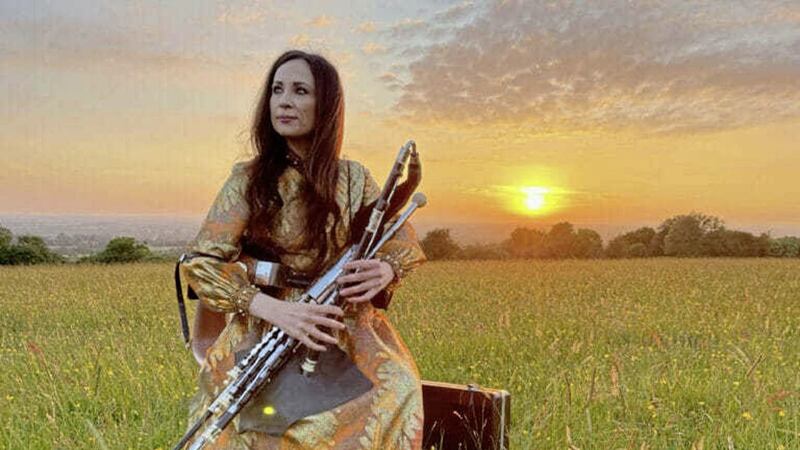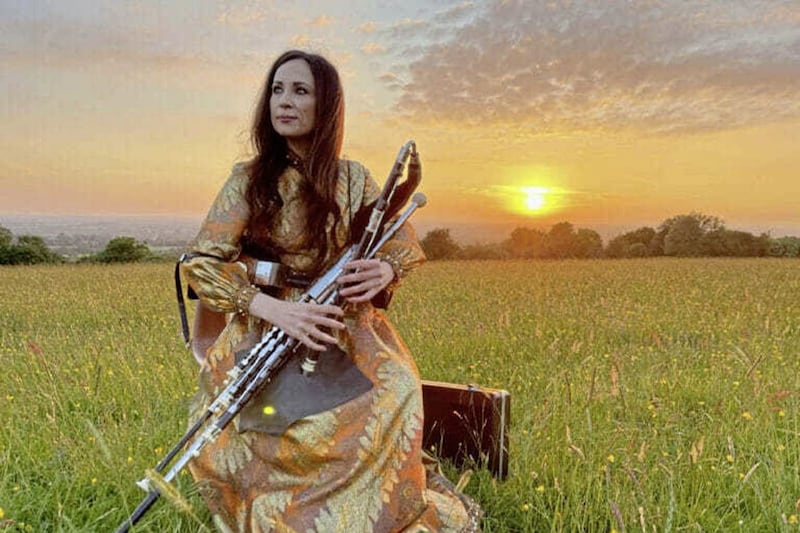A coffin with a glass lid, an IRA safe house and a woman with a drink problem who left her six children - these are just some of the unlikely ingredients of Louise Mulcahy's highly entertaining biography of female uilleann pipers, Mná na bPíob, which is being broadcast on TG4 on Sunday December 19 at 9.30pm.
The hour-long programme is a glorious mix of storytelling, the finest of music, nostalgia (it features the late Paddy Moloney), Irish social history over the past century and more, but at the heart of it is Louise's quest to find out about the forgotten women who chose to play the uilleann pipes for one reason or another.
It was as a teenager, born into a famously musical family in Abbeyfeale, Co Limerick, that Louise herself began to play what is generally recognised as a difficult instrument to play and maintain, but it was the sound of the pipes that won her over.
"It's an exceptionally beautiful instrument and the sound is so powerful," she says.
"That is something which grabbed my attention from a very early age. I come from a musical household and my father Mick plays and my sister Michelle also plays, but there was always a huge collection of recordings which included uilleann pipe recordings.
"So I was listening to all the masters the time I was in the cot, really. And that's something which I'm very fortunate that, you know, I was exposed to that type of music and that level of music from a very early age.
"I think when you hear a set of uilleann pipes, going superbly, there's nothing more magical."
That early exposure as well as her innate musical ability has led her to become one of the finest musicians of her generation.
Not only that, but an enquiring mind has led Louise into areas of research which is shedding light on forgotten aspects of traditional music.
In the Mulcahy household was a copy of by Captain Francis O'Neill's Irish Minstrels and Musicians, published in 1913 and reprinted in 1979.
It was there that Louise found photographs and biographical details of some of the few women pipers of the day.
"I really wanted to share the lives of these fascinating women with a wider audience and so I decided to work with the TV company Tyrone Productions to bring the story to life on screen," she explains.
Over the next five or six years, Louise did whatever research was possible in what she says is still a work in progress.
"I had so many questions about their lives, their music, their piping, their careers, if they married, if they had a family, if they continued playing. And if they did, if they didn't, what were the reasons, and why have we not heard anything of them since O'Neill's publication or in any of the articles that I had kept as a teenager and as a young adult," she says.
The women include Kitty Hanley from Limerick. In the words of historian Sharon Slater, "Kitty's pipes kept her from the poor house," which shows how earning a few pennies by playing in the streets could make all the difference to a family.
The pipes belonged to her husband which she ran off with, leaving him to look after their six children, a court report of 1882 tells us.
It quotes an official saying that while the husband had a very bad tongue, "his wife is a great drunkard."
May McCarthy joined the Cork Piping Club which was opened in 1898. Such was her piping prowess, she was invited to play in Wales and in England but May was also a member of Cumann na mBan and would play concerts to raise funds for the IRA, while her home in Cork was a safe house for those on the run. May also founded her own ceili band and died in 1961.
In Mná na bPíob, Louise got the chance to play May's pipes.
"For me, it was incredibly, emotional," she recalls.
"What actually happened with that particular scene was, right up to the night before, we weren't sure if the gentleman could bring May's pipes because of the situation with Covid at that time, and I had only located the pipes that week.
"He arrived. It was raining, he couldn't come in. He was very emotional because nobody had really shown an interest in the pipes nor had he ever been interviewed about them."
But it is not just in the deep south of the country that women were playing the uilleann pipes.
In Carnlough lived Netta Jane Nicholl Johnson, a very refined lady who was, shall we say, rather eccentric.
Miss Johnson, as she was known, played the organ at Ardclinis Church of Ireland and was a great lover of music.
"Miss Johnson's prime objective was to promote Irish traditional music in Carnlough, to set up an uilleann piping school and to promote non sectarian music and flute bands in that area as well," explains Louise.
"In fact, she founded the non-sectarian flute band in the town."
Miss Johnson also inherited an undertaker's business and it is said she requested a coffin with a glass top but failing that, she made her own coffin - it's not recorded what the top was made of - which she kept under her bed.
Netta's pipes are kept in the Ulster Museum in Belfast.
Wherever they lived, there were of course many obstacles in the way of female pipers but things have changed since Kitty Hanley stole her husband's set of pipes.
The social status of women and the opportunities that presented to women were much more limited than they are today, but even in the 1950s, women stopped playing for economic reasons.
"One particular lady had just got engaged, she wanted to get married and they wanted to buy a house so the pipes had to go," says Louise.
"And another woman had to sell her pipes because she wanted to buy a Holy Communion outfit for her son."
While the stories in Mná na bPíob are fascinating, equally important of course is the music and there are fine renditions of well- and not so well-known tunes by various combinations of today's female pipers, with Louise's version of Bean Dubh a' Ghleanna a standout.
Finally, piping tutor Gay McKeon says that at the present time, there are more girls learning the pipes at Cumann na bPíobairí Uilleann's classes at their headquarters in Dublin.
Louise had beautifully traced the funny, tragic and finally uplifting musical journey that has brought that about.
:: Mná na bPíob is on TG4 on Sunday December 19 at 9.30pm.



